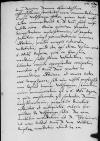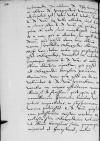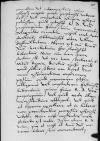Causa ⌊Volfgangi Foller⌋, quam tanto mihi studio commendavit Reverendissima Dominatio Vestra, fuit mihi valde curae. Quae quoniam propter diversitatem inscriptionum et propter stabulum quasi permutationis nomine additum paulo magis intricata videbatur — quod ita ipsi etiam visum erat
s(erenissimae) or s(acrae)⌈s(erenissimae)s(erenissimae) or s(acrae)⌉
⌊maiestati written over e⌈eii written over e⌉ regiae⌋, quae in hac sua nondum satis firma valetudine non libenter causis cognoscendis occupatur — conatus est ⌊reverendissimus dominus⌋ partes in concordiam adducere et amice inter eas transigere. Sed cum nihil profecisset, non defuit tamen ⌊Volfgango⌋, secundum quem pronuntiatum est a
s(erenissima) or s(acra)⌈s(erenissima)s(erenissima) or s(acra)⌉
⌊maiestate regia⌋, a qua confirmata est sententia dominorum consiliariorum prioribus duabus inductis et antiquatis. Atque haec quidem de ⌊Volfgango⌋ satis.
De arca mittitur mandatum ad ⌊dominum thesaurarium⌋, ut eam tradat Reverendissimae Dominationi Vestrae. Mittitur duplex mandatum aliud de ea  BCz, 1618, p. 354 inspicienda. In altero ⌊dominus thesaurarius⌋, in altero dominus ⌊praepositus Varmiensis⌋ adscriptus est. Utro volet, utatur licebit hidden by binding⌈[it]it hidden by binding⌉ Reverendissima Dominatio Vestra.
BCz, 1618, p. 354 inspicienda. In altero ⌊dominus thesaurarius⌋, in altero dominus ⌊praepositus Varmiensis⌋ adscriptus est. Utro volet, utatur licebit hidden by binding⌈[it]it hidden by binding⌉ Reverendissima Dominatio Vestra.
Ex ⌊urbe⌋ allatae sunt litterae a ⌊sororis filio⌋ Reverendissimae Dominationis Vestrae, ex quibus quae ibi acta sint, intelliget. Contendit hidden by binding⌈[dit]dit hidden by binding⌉ ⌊is⌋ a me, quo ei adiutor sim apud ⌊reverendissimum dominum⌋, quo possit bona cum illius venia sacerdotia ⌊Alexandri⌋ obtinere. Mihi vero statim initio, cum proscriptus esset ⌊Alexander⌋, veniebat in mentem ⌊propinqui huius⌋ Reverendissimae Dominationis Vestrae, et certe illum adiutum cupiebam, quo posset ad Alexandri beneficia pervenire. Quoniam vero quae esset ea de re voluntas Reverendissimae Dominationis Vestrae, ignorabam ac verebar, ne magis offenderem animum illius, si id fecissem, quod — quae est nonnullorum hominum levitas vel potius improbitas — in suspicionem venire potuisset Reverendissima Dominatio Vestra, quasi ob eam potissimum causam eiectum ex ecclesia sua ⌊Alexandrum⌋ voluerit, ut illius beneficiis suum propinquum augeret et honestaret, nolui  BCz, 1618, p. 355 committere, ut intempestive officio offecisse magis quam profecisse viderer. Sed si vel coniectura aliqua assequi potuissem, quod optasset Reverendissima Dominatio Vestra ⌊propinquum hunc suum⌋ canonicatu ⌊Alexandri⌋ ornatum, nihil erat factu facilius, obtinuisset citra ullam difficultatem. Nemo est, cui Reverendissimus Dominus sacerdotium hoc favisset libentius. Nunc cum mea opera factum sit, ut pro ⌊Loca⌋ scriberet
s(erenissima) or s(acra)⌈s(erenissima)s(erenissima) or s(acra)⌉
⌊maiestas regia⌋, duabus mihi, quod aiunt, sellis sedere non licet. Hoc omni asseveratione confirmare possum, quod neminem istic collegam vel confratrem habuissem libentius quam hunc Reverendissimae Dominationis Vestrae ⌊propinquum⌋, vel quod arcta illam necessitudine attingit, vel quod et ingenio excellere, et in litteris non paenitendos processus effecisse videtur. Nunc mihi constantiae meae habenda est ratio. Ipsam etiam Reverendissimam Dominationem Vestram, quae et mihi, et ⌊reverendissimo domino meo⌋ ⌊Locam⌋ litteris suis commendavit,
BCz, 1618, p. 355 committere, ut intempestive officio offecisse magis quam profecisse viderer. Sed si vel coniectura aliqua assequi potuissem, quod optasset Reverendissima Dominatio Vestra ⌊propinquum hunc suum⌋ canonicatu ⌊Alexandri⌋ ornatum, nihil erat factu facilius, obtinuisset citra ullam difficultatem. Nemo est, cui Reverendissimus Dominus sacerdotium hoc favisset libentius. Nunc cum mea opera factum sit, ut pro ⌊Loca⌋ scriberet
s(erenissima) or s(acra)⌈s(erenissima)s(erenissima) or s(acra)⌉
⌊maiestas regia⌋, duabus mihi, quod aiunt, sellis sedere non licet. Hoc omni asseveratione confirmare possum, quod neminem istic collegam vel confratrem habuissem libentius quam hunc Reverendissimae Dominationis Vestrae ⌊propinquum⌋, vel quod arcta illam necessitudine attingit, vel quod et ingenio excellere, et in litteris non paenitendos processus effecisse videtur. Nunc mihi constantiae meae habenda est ratio. Ipsam etiam Reverendissimam Dominationem Vestram, quae et mihi, et ⌊reverendissimo domino meo⌋ ⌊Locam⌋ litteris suis commendavit,  BCz, 1618, p. 356 facturam confido, ut in sua erga illum hidden by binding⌈[m]m hidden by binding⌉ voluntate perstet. Dabitur alia ⌊propinqui illius⌋ ornandi occasio, qui mihi certe omnibus ornamentis dignus videtur. Sed duae istae impetrationes meo iudicio parvi sunt hidden by binding⌈[t]t hidden by binding⌉ momenti. Illa demum valebit, quae hidden by binding⌈[ae]ae hidden by binding⌉ facta fuerit, posteaquam pronuntiabitur hidden by binding⌈[itur]itur hidden by binding⌉ hidden by binding⌈[] hidden by binding⌉ vacare sacerdotia. Causa haec per s(erenissimam) or s(acram)⌈s(erenissimam)s(erenissimam) or s(acram)⌉ ⌊maiestatem regiam⌋ et ⌊reverendissimum dominum⌋ domino doctori ⌊Rzeczicza⌋ in ⌊urbe⌋ commissa est. Is ne verbum quidem adhuc scripsit, ac nisi ⌊propinqui⌋ Reverendissimae Dominationis Vestrae litterae allatae essent, quid actum esset ⌊Romae hidden by binding⌈[ae]ae hidden by binding⌉⌋ in causa ⌊Alexandri⌋, in hunc usque diem nesciremus. Exspectamus tamen hidden by binding⌈[n]n hidden by binding⌉ in horas aliquid a doctore ⌊Rzeczicza⌋, qui fortasse scriptionem differt, dum confectum det negotium. Hic nova, quae sunt descripta, mitti written over a⌈aii written over a⌉t Reverendissimae Dominationi Vestrae reverendissimus dominus.
S(erenissima) or S(acra)⌈S(erenissima)S(erenissima) or S(acra)⌉
⌊maiestas regia⌋ pulchre convalescit. Spes est in Christo, eam ad hidden by binding⌈[ad]ad hidden by binding⌉ festa ista Natalicia in templum prodituram.
BCz, 1618, p. 356 facturam confido, ut in sua erga illum hidden by binding⌈[m]m hidden by binding⌉ voluntate perstet. Dabitur alia ⌊propinqui illius⌋ ornandi occasio, qui mihi certe omnibus ornamentis dignus videtur. Sed duae istae impetrationes meo iudicio parvi sunt hidden by binding⌈[t]t hidden by binding⌉ momenti. Illa demum valebit, quae hidden by binding⌈[ae]ae hidden by binding⌉ facta fuerit, posteaquam pronuntiabitur hidden by binding⌈[itur]itur hidden by binding⌉ hidden by binding⌈[] hidden by binding⌉ vacare sacerdotia. Causa haec per s(erenissimam) or s(acram)⌈s(erenissimam)s(erenissimam) or s(acram)⌉ ⌊maiestatem regiam⌋ et ⌊reverendissimum dominum⌋ domino doctori ⌊Rzeczicza⌋ in ⌊urbe⌋ commissa est. Is ne verbum quidem adhuc scripsit, ac nisi ⌊propinqui⌋ Reverendissimae Dominationis Vestrae litterae allatae essent, quid actum esset ⌊Romae hidden by binding⌈[ae]ae hidden by binding⌉⌋ in causa ⌊Alexandri⌋, in hunc usque diem nesciremus. Exspectamus tamen hidden by binding⌈[n]n hidden by binding⌉ in horas aliquid a doctore ⌊Rzeczicza⌋, qui fortasse scriptionem differt, dum confectum det negotium. Hic nova, quae sunt descripta, mitti written over a⌈aii written over a⌉t Reverendissimae Dominationi Vestrae reverendissimus dominus.
S(erenissima) or S(acra)⌈S(erenissima)S(erenissima) or S(acra)⌉
⌊maiestas regia⌋ pulchre convalescit. Spes est in Christo, eam ad hidden by binding⌈[ad]ad hidden by binding⌉ festa ista Natalicia in templum prodituram.
Qui et Vestram Reverendissimam Dominationem in hidden by binding⌈[n]n hidden by binding⌉ multos annos incolumem servet ac felicem. Cuius me gratiae commendo.
 BCz, 1618, p. 354 inspicienda. In altero
BCz, 1618, p. 354 inspicienda. In altero  BCz, 1618, p. 355 committere, ut intempestive officio offecisse magis quam profecisse viderer. Sed si vel coniectura aliqua assequi potuissem, quod optasset Reverendissima Dominatio Vestra
BCz, 1618, p. 355 committere, ut intempestive officio offecisse magis quam profecisse viderer. Sed si vel coniectura aliqua assequi potuissem, quod optasset Reverendissima Dominatio Vestra  BCz, 1618, p. 356 facturam confido, ut in sua erga illum hidden by binding⌈[m]m hidden by binding⌉ voluntate perstet. Dabitur alia
BCz, 1618, p. 356 facturam confido, ut in sua erga illum hidden by binding⌈[m]m hidden by binding⌉ voluntate perstet. Dabitur alia 


